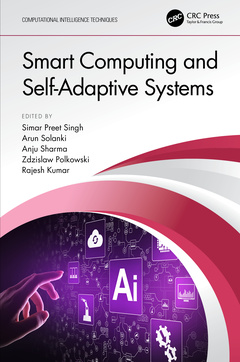Smart Computing and Self-Adaptive Systems Computational Intelligence Techniques Series
Coordonnateurs : Singh Simar Preet, Solanki Arun, Sharma Anju, Polkowski Zdzislaw, Kumar Rajesh

The book intends to cover various problematic aspects of emerging smart computing and self-adapting technologies comprising of machine learning, artificial intelligence, deep learning, robotics, cloud computing, fog computing, data mining algorithms, including emerging intelligent and smart applications related to these research areas. Further coverage includes implementation of self-adaptation architecture for smart devices, self-adaptive models for smart cities and self-driven cars, decentralized self-adaptive computing at the edge networks, energy-aware AI-based systems, M2M networks, sensors, data analytics, algorithms and tools for engineering self-adaptive systems, and so forth.
Acts as guide to Self-healing and Self-adaptation based fully automatic future technologies
Discusses about Smart Computational abilities and self-adaptive systems
Illustrates tools and techniques for data management and explains the need to apply, and data integration for improving efficiency of big data
Exclusive chapter on the future of self-stabilizing and self-adaptive systems of systems
Covers fields such as automation, robotics, medical sciences, biomedical and agricultural sciences, healthcare and so forth
This book is aimed researchers and graduate students in machine learning, information technology, and artificial intelligence.
Chapter 1. Using Luong and Bahdanau Attention Mechanism on the Long Short Term Memory Networks - A COVID-19 Impact Prediction Case Study. Chapter 2. A Novel Missing Data Imputation Algorithm for Deep Learning-Based Anomaly Detection System in IIoT Networks. Chapter 3. Internet of Things: A Concept, implementations & Applications. Chapter 4. Output Oriented Multi-Pane Mail Booster: Data Crawling And Results In All Category Panes of a Mail. Chapter 5. Eyesight Test through Remote Virtual doctor using IoT. Chapter 6. Recent Trends and Advances in Deep Learning-based Internet of Things. Chapter 7. Prediction and Classification analysis of Type-2 Diabetes using Machine Learning Approaches. Chapter 8. Internet of Thing Based Monitoring Systems and Their Applications. Chapter 9. A Progressive Method to Monitor Power Using IoT. Chapter 10. Cognitive Computing Powered, NLP Based, Autonomous Question-Answering System. Chapter 11. Smart cities and industry 4.0. Chapter 12. Deep Learning Approach in Malware Hunting. Chapter 13. Prediction of Breast and lung Cancer, Comparative Review and Analysis Using Machine Learning Techniques.
Dr. Simar Preet Singh, presently an Assistant Professor at School of Computer Science Engineering and Technology (SCSET), Bennett University, Greater Noida, Uttar Pradesh is also a Microsoft Professional. Apart from this he is also having certifications like Microsoft Certified System Engineer (MCSE), Microsoft Certified Technology Specialist (MCTS) and Core Java. He had also undergone training programme for VB.Net and Cisco Certified Network Associates (CCNA). He has worked with Infosys Limited, DAV University, Jalandhar, Chandigarh Group of Colleges, Landran, Mohali and GNA University, Phagwara. He also has International Trip and International Project to his name. He has published SCI/SCIE/Scopus-Indexed papers. He has presented many research papers in various National and International Conferences in India and abroad. In addition to these, he is an Editor of multiple books and also has Patents to his name. His areas of interests include Cloud Computing, Fog Computing, IoT, Bigdata and Machine Learning.
Dr. Arun Solanki is working as Assistant Professor in the Department of Computer Science and Engineering, Gautam Buddha University, Greater Noida, India where he has been working since 2009. He has worked as Time Table Coordinator, member Examination, Admission, Sports Council, Digital Information Cell, and other university teams from time to time. He has received M.Tech. Degree in Computer Engineering from YMCA University, Faridabad, Haryana, India. He has received his Ph.D. in Computer Science and Engineering from Gautam Buddha University in 2014. He has supervised more than 60 M.Tech. dissertations under his guidance.
His research interests span Expert System, Machine Learning, and Search Engines. He has published many research articles in SCI/ Scopus indexed International journals/conferences like IEEE, Elsevier, Springer, etc. He has participated in many international conferences. He has been a technical and ad
Date de parution : 12-2021
15.6x23.4 cm
Thèmes de Smart Computing and Self-Adaptive Systems :
Mots-clés :
IoT Application; Smart Devices; Smart Cities; Artificial Intelligence; Power Consumption; Block Chain; IoT Device; Machine Learning; Ml Algorithm; Deep Learning; Deep Learning Techniques; System of Systems; Random Forest; RNN; Lung Cancer Dataset; Hidden Layer; Missing Data Imputation; Breast Cancer Dataset; Missing Data; Training Data Records; Imputed Dataset; Missing Values; Power Monitoring System; Context Vector; RFID Tag; Supervise Ml Algorithm; Cyber Physical Systems; Batch Normalization; IoT Security; Full Field Electroretinogram; Input Dataset


